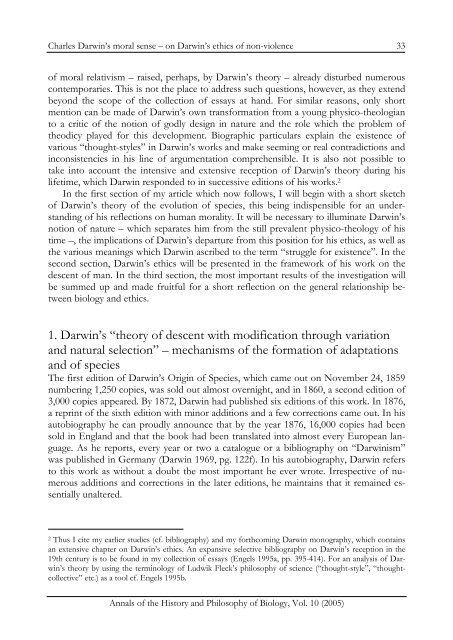Annals of the History and Philosophy of Biology
Annals of the History and Philosophy of Biology
Annals of the History and Philosophy of Biology
You also want an ePaper? Increase the reach of your titles
YUMPU automatically turns print PDFs into web optimized ePapers that Google loves.
Charles Darwin’s moral sense – on Darwin’s ethics <strong>of</strong> non-violence<br />
<strong>of</strong> moral relativism – raised, perhaps, by Darwin’s <strong>the</strong>ory – already disturbed numerous<br />
contemporaries. This is not <strong>the</strong> place to address such questions, however, as <strong>the</strong>y extend<br />
beyond <strong>the</strong> scope <strong>of</strong> <strong>the</strong> collection <strong>of</strong> essays at h<strong>and</strong>. For similar reasons, only short<br />
mention can be made <strong>of</strong> Darwin’s own transformation from a young physico-<strong>the</strong>ologian<br />
to a critic <strong>of</strong> <strong>the</strong> notion <strong>of</strong> godly design in nature <strong>and</strong> <strong>the</strong> role which <strong>the</strong> problem <strong>of</strong><br />
<strong>the</strong>odicy played for this development. Biographic particulars explain <strong>the</strong> existence <strong>of</strong><br />
various “thought-styles” in Darwin’s works <strong>and</strong> make seeming or real contradictions <strong>and</strong><br />
inconsistencies in his line <strong>of</strong> argumentation comprehensible. It is also not possible to<br />
take into account <strong>the</strong> intensive <strong>and</strong> extensive reception <strong>of</strong> Darwin’s <strong>the</strong>ory during his<br />
lifetime, which Darwin responded to in successive editions <strong>of</strong> his works. 2<br />
In <strong>the</strong> first section <strong>of</strong> my article which now follows, I will begin with a short sketch<br />
<strong>of</strong> Darwin’s <strong>the</strong>ory <strong>of</strong> <strong>the</strong> evolution <strong>of</strong> species, this being indispensible for an underst<strong>and</strong>ing<br />
<strong>of</strong> his reflections on human morality. It will be necessary to illuminate Darwin’s<br />
notion <strong>of</strong> nature – which separates him from <strong>the</strong> still prevalent physico-<strong>the</strong>ology <strong>of</strong> his<br />
time –, <strong>the</strong> implications <strong>of</strong> Darwin’s departure from this position for his ethics, as well as<br />
<strong>the</strong> various meanings which Darwin ascribed to <strong>the</strong> term “struggle for existence”. In <strong>the</strong><br />
second section, Darwin’s ethics will be presented in <strong>the</strong> framework <strong>of</strong> his work on <strong>the</strong><br />
descent <strong>of</strong> man. In <strong>the</strong> third section, <strong>the</strong> most important results <strong>of</strong> <strong>the</strong> investigation will<br />
be summed up <strong>and</strong> made fruitful for a short reflection on <strong>the</strong> general relationship between<br />
biology <strong>and</strong> ethics.<br />
1. Darwin’s “<strong>the</strong>ory <strong>of</strong> descent with modification through variation<br />
<strong>and</strong> natural selection” – mechanisms <strong>of</strong> <strong>the</strong> formation <strong>of</strong> adaptations<br />
<strong>and</strong> <strong>of</strong> species<br />
The first edition <strong>of</strong> Darwin’s Origin <strong>of</strong> Species, which came out on November 24, 1859<br />
numbering 1,250 copies, was sold out almost overnight, <strong>and</strong> in 1860, a second edition <strong>of</strong><br />
3,000 copies appeared. By 1872, Darwin had published six editions <strong>of</strong> this work. In 1876,<br />
a reprint <strong>of</strong> <strong>the</strong> sixth edition with minor additions <strong>and</strong> a few corrections came out. In his<br />
autobiography he can proudly announce that by <strong>the</strong> year 1876, 16,000 copies had been<br />
sold in Engl<strong>and</strong> <strong>and</strong> that <strong>the</strong> book had been translated into almost every European language.<br />
As he reports, every year or two a catalogue or a bibliography on “Darwinism”<br />
was published in Germany (Darwin 1969, pg. 122f). In his autobiography, Darwin refers<br />
to this work as without a doubt <strong>the</strong> most important he ever wrote. Irrespective <strong>of</strong> numerous<br />
additions <strong>and</strong> corrections in <strong>the</strong> later editions, he maintains that it remained essentially<br />
unaltered.<br />
2 Thus I cite my earlier studies (cf. bibliography) <strong>and</strong> my forthcoming Darwin monography, which contains<br />
an extensive chapter on Darwin’s ethics. An expansive selective bibliography on Darwin’s reception in <strong>the</strong><br />
19th century is to be found in my collection <strong>of</strong> essays (Engels 1995a, pp. 395-414). For an analysis <strong>of</strong> Darwin’s<br />
<strong>the</strong>ory by using <strong>the</strong> terminology <strong>of</strong> Ludwik Fleck’s philosophy <strong>of</strong> science (“thought-style”, “thoughtcollective”<br />
etc.) as a tool cf. Engels 1995b.<br />
<strong>Annals</strong> <strong>of</strong> <strong>the</strong> <strong>History</strong> <strong>and</strong> <strong>Philosophy</strong> <strong>of</strong> <strong>Biology</strong>, Vol. 10 (2005)<br />
33

















